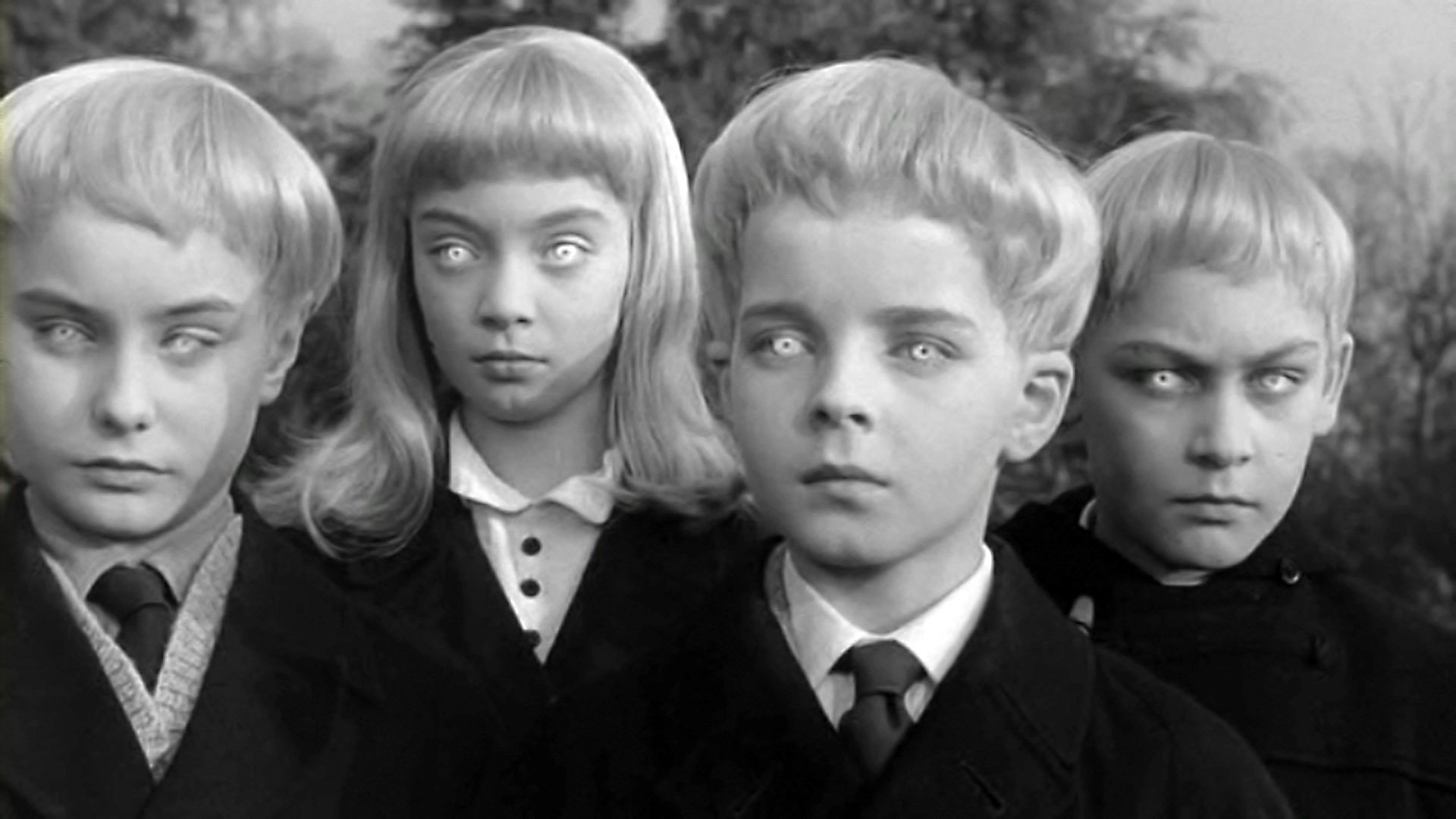
Village Of The Damned (1959)
“You have to be taught to leave us alone. If you didn’t suffer from emotions, from feelings, you could be as powerful as we are.”
Scenes don't come more English than the beginning of Village Of The Damned. Tractors plough fields, lovely music plays, it's a rural idyll.
And perhaps that's why a strange extra-terrestrial force picks this spot to strike, as everyone in the area suddenly collapses, leading to overflowing basins and scratched records a-plenty. Yes, it's 11am in Midwich, and all is definitely not well…
Luckily, one of the villagers, Gordon (George Sanders) was on the phone to his brother-in-law, Major Alan Bernard, in Whitehall when the big human switch-off happened, so the puzzled Major (Michael Gwynn) hotfoots it over to see what's going on.
There's something very pre-1970 about the idea that an entire village in the middle of England can suddenly get cut off from the outside world without anyone noticing, but that's what has happened. On arriving on the outskirts, Gwynn meets up with a bobby who cycles slightly further up the Midwich road and promptly falls to the floor, unconscious. The army are soon on the scene, and they find that whatever it is that's causing the problem has a very definite edge, and can penetrate their respirators. After a disastrous experiment with a light aircraft (one of the great "what were they thinking?" moments), it is noticed that people and cows are waking up in nearby fields - as they are across the village…
The villagers are at a loss, after all, as one points out: "You don't 'ardly expect to drop asleep before dinner, do yer?"
And the army are none the wiser either, despite their Geiger counters.
Cut to several months later, and Gordon's wife Anthea (Barbara Shelley) has developed a taste for pickles. Her husband's quaint reaction to the news that he's about to become a dad (very "Doctor In Love") is contrasted with the shock felt by most of the rest of the village when it becomes apparent that every woman of child bearing age is also expecting - including a distraught single girl ("I've never… it's impossible… impossible…") and the wife of Jim, who's been away for a year (oh-oh…)
Come the village's big day, and the (seemingly lone) midwife has a busy evening, with every baby arriving at pretty much the same time (and months early). All the village men are in the pub, drinking and smoking heavily. "I 'ope that none of 'em lives," says the formerly chirpy bloke who made the crack about sleeping before dinner.
All the babies are born safely - each weighing more than 10lb and with "strange eyes". Furthermore, they grow extremely rapidly and analysis of their hair and fingernails shows strange peculiarities. Not to mention their unnerving habit of punishing their parents if something hurts them (Anthea is made to scald herself when the milk she gives their child David is too hot).
There's another flash forward a couple of years and we see the children, wandering around the village in a little duffle coat-clad gang. "You wish we wouldn't come here," says their leader David to the woman in the local shop, apparently reading her mind.
It's not too hard to read the mind of Major Bernard though, who tells his brother-in-law: "People aren't measured by their high IQ. What is important is if they are good or bad - and these children are bad!"
But Gordon's judgement has been clouded by his scientific interest in the children (and David, the cleverest). He won't see any harm come to them, but there's no love there. As he coldly corrects Bernard: "Anthea's son. I have no proof that he's mine."
Up until now, we've assumed that Midwich is the only such community with these problems - but that turns out not to be the case. The Government tells Gordon that a group of Eskimos killed their children at birth, and in Urkutsk the men killed their children, and then the mothers. But in Russia, they're busy educating their brood…
And yet, no-one knows where the children came from. "What we can do, others elsewhere in the Universe can do better…" speculates Gordon, stating that he believes the children together are "one mind to the 12th power". A power which they are already using to kill.
He talks the Government into handing the children over to him, believing he can condition them to behave in a more orderly way. "Take a look at our world, have we made a good job of it?" he says. "Who is to say these children aren't the answer?"
But he soon realises he's out of his depth with the dirty dozen, as they start to cut a swathe through the village, killing anyone who remotely annoys them. One man is forced to drive his car full tilt at a wall, another puts a shotgun under his chin and pulls the trigger. As they get reports that the Russians have ended up bombing their own children ("They had begun to… take control," explains Bernard), the menfolk of the village come to the same conclusion and advance on the tykes with flaming torches aloft.
Village Of The Damned is much more chilling than its seemingly cosy premise would have you think. The children themselves are amongst the most terrifying "villains" in filmland, blank-faced, with no clear motive, and the ability to kill without compunction. They are also almost indestructible - the Russians have to resort to a nuclear bomb to solve their "problem", and, as Gordon speculates: "Troops are not the answer. The children would make them shoot each other."
"We have to survive, no matter what the cost. " says David at one point. "You have to be taught to leave us alone. If you didn't suffer from emotions, from feelings, you could be as powerful as we are."
